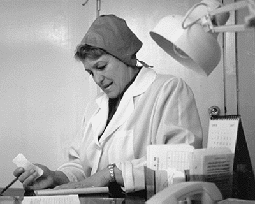
![]()

|
EMERGENCY CONTRACEPTION |
|
 |
Nonetheless, now and then women find themselves in situations when they have no time to think of all the aspects above; they simply wish to avoid unwanted pregnancy regardless of associated risks and costs and thus escape the need for subsequent artificial abortion. Situation may become this critical due to negligence or failure of regular prevention. So, what shall we do then? First of all, not panic. And second, remember of emergency prevention. For more information about modern methods of emergency contraception, we turned to Raisa Alexandrovna Dorovskikh, physician consultant in obstetrics, gynecology and sexually transmitted diseases, SANAM Medical Care and Diagnostic Center, Moscow. |
Postcoital or emergency contraceptives are implements individuals may want to use to prevent impregnation after an unsafe sexual intercourse have taken place. Emergency prevention is for emergency cases only. In medical literature it is also referred to as urgent, immediate, extraordinary, "fire-alarm", and "morning-after" prevention. But the most conventional term is "postcoital contraception".
What are medical indications for this sort of contraception?
Would you, please, describe the action of emergency contraceptives?
The major mechanisms of postcoital contraceptives are: deregulating physical menstrual cycle, suppressing ovulation, obstructing fertilization process, preventing ovum transportation and implantation and fetus development. Variety of mechanisms make these drugs effective at any stage -- from ovulation through fertilization to ovum implantation. Spermatozoa are known to live for three to seven days in vaginal environment while ovulum lives for 12 to 24 hours. Therefore, conception is much more probable to be result of sexual intercourse having taken place before ovulation that is during the first phase of cycle than in the second phase.
So, what measures can help prevent conception once a sexual intercourse with no protection have occurred?
Vaginal syringing, though long popular, is quite inefficient -- it helps in 39% of cases. Postcoital vaginal spermicides (such as Luthenurine) are much more effective: 80% of positive outcomes, although this figure may be argued. Besides, clinical tests have shown decreased protective effectiveness of spermicides after their systematic application.
Today the prevalent means of postcoital prevention is intrauterine device. IUD may be inserted within 5-7 days period after unprotected coition, and its effectiveness is higher if compared to other methods. But prescribing IUD requires thorough assessment of patient's individual characteristics, screening for possible contra-indication and patient's willingness to use IUD for reasonable period in future. There is no sense in applying IUD to a patient concerned with this-month protection only. On IUD insertion, there is always certain risk of developing complications affecting uterus and ovary. IUD is not suitable for postcoital contraception in cases of teenage patients or individuals frequently changing partners because these populations are at high risk of infectious and inflammatory diseases. IUD insertion procedure may be combined with antimicrobial therapy.
Another method of emergency contraception is hormonal medication. Most researchers agree that hormonal postcoital contraceptives are effective if used within 24 to 72 hours from the moment of intercourse; otherwise, an ovum may have time to implant. Hormonal agents used for emergency prevention include:
Estrogens
Estrogens were the first therapeutic postcoital contraceptives. The method had been developed back in 60's and since then estrogens proved to cause numerous adverse effects.
Estrogen/Gestagen Combinations
Medication complex is prescribed in two equal doses: patient takes 3 to 6 pills (as specified by drug manufacturer) within 72 hours from the moment of intercourse, and then 3 or 6 pills 12 hours later. The effectiveness of this method is 97-99%. Contra-indications include: serious liver disorders, breast cancer, and smoking after 35 (insensibility).
Gestagens
Postinor is gestagenic drugs widely spread in Russia. Postinor desynchronizes menstrual cycle or interferes with conception processes which depends on the day of its usage. If taken seven days before ovulation date, it suppresses ovulum development. If taken after fertilization, it prevents its implantation in uterus. Requirements for successful impregnation are many: the ovum must return to the uterus, in ovary a yolk bag must develop to feed the ovum. Postinor intervenes these processes. The ovary fails to produce yolk substance and the ovum is alienated by the uterus. But patients must strictly follow prescriptions and never take more than four pills monthly. Extra dose puts you at risk of opening acute bleeding. Postinor's effectiveness is known to be 97.6%.
Danazol
Danazol is another gestagen-containing drugs. Recommended dosage is one 400 mg pill every 12 hours (two or three intakes is enough) within 72-hours from unsafe sex. In addition to gestagen, Danazol contains androgen component.
Mifeproston
Non-hormonal Drugs Mifeproston is even more effective in pregnancy prevention than hormonal pills. It obstructs ovum implantation. Mifeproston causes energetic uterine contractions, so sometimes it is used also for inducing early abortions. Dosage: three pills at one intake, or one pill a day for 72 hours beginning from unsafe sex, or one pill a day on 23, 24, 25, 26 and 27 days of menstrual period. No side effects of Mifepriston are known. Mifepriston does not contain hormones.
What are possible adverse effects of these medications?
All the mentioned drugs (except Mifepriston) may have similar side effects: nausea, vomiting, headaches, breast swelling, stomachaches. If preventive measures fail, childbearing is not recommended anyway, though there is no reliable data indicating that fetus is put at serious hazards.
Do I need formal doctor's prescription to buy any of those drugs?
As for hormonal drugs, prescriptions are not required now. To buy Mifepriston, however, you will need physician's prescription.
If postcoital contraceptives are these convenient, why not use them on regular basis? For instance, combine Postinor four time a month as required with Danazol and Mifepriston?
You cannot use same drugs for long periods. You should shift between different methods of contraception.
What would be your best wishes to all women?
Watch your health!
http://www.healthwire.com/women/
A Forum for Women's Health. Provides medical data and specialists consultations.
http://econ-www.newcastle.edu.au/statistics/womens_health/
Breast Implants. Contains information about different aspects of breast
implanting procedures and their overall health effects.
http://members.aol.com/jacobsinst/welcome.html
Jacobs Institute of Women's Health. Non-profit institution. Offers publications,
researches, studies, educational materials and practical recommendations
to help women improve their health.
http://www.best.com/~sirlou/wmhp.html
Women's Medical Health Page. Current information about recent studies
and publications relevant to women's health.
http://www.womencare.com/
WomenCare Virtual Clinic. All kinds of information useful for women's
self-education, especially after 40. Addresses problems of physical, mental
and spiritual health. Provides opportunity to discuss your problem with
practitioner.
http://feminist.com/health.htm
Women's Health Issue. Describes new development and researches relevant
to women's health.
http://critpath.org/~tracy/spot.html
S.P.O.T. Educational effort to enlighten women about health hazards associated
with synthetic tampons.
http://www.io.com/~wwwomen
Web by Women, for Women. This page also includes information on health
problems, along with sex-related and other issues of women's interest.
http://nytsyn.com/med/Womens_health/
Women's Health - Your Health Daily. Latest health news available.
http://www.womenshealth.com/
Women's Health America Group. Informs about healthy life-style, diets,
etc.
http://pages.prodigy.com/HYEW27A/womart.htm
Women's Health Articles. Concise library of women's health. Articles
include those on exercises, acupuncture, menopausal period and many others.
http://www.soft-designcom/softinfo/womens_health.html
Women's Health Hot Line. No comment.
http://www.womens-health.com/
Women's Health Interactive. Any health-related questions welcome.
http://www.web.net/cwhn/resource/resource.html
Women's Health Resource. This service is run by Canadian Women's Health
network and provides description of best resources available for women's
health protection and improvement.
| BACK TO THE CONTENT |
|